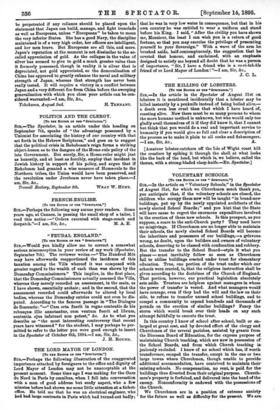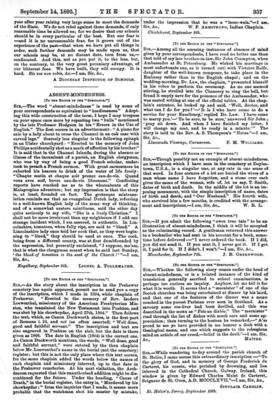VOLUNTARY SCHOOLS.
[TO THE EDITOR OF THE " SPZCTATOR.'1 Sin,—In the article on " Voluntary Schools," in the Spectator- of August 31st, for which we Churchmen much thank you,. you anticipate that, if the voluntary schools are closed, the children who occupy them now will be taught "in brand-new buildings, put up by the newly appointed architects of the newly elected School Boards ;" and you hint that the State will have cause to regret the enormous expenditure involved in the erection of these new schools. Is this prospect, as you- suppose, a scare to the anti-Church party ? They need have no misgivings. If Churchmen are no longer able to maintain their schools, the newly elected School Boards will become the inheritors and possessors of our buildings,—a grievous wrong, no doubt, upon the builders and owners of voluntary schools, deserving to be classed with confiscation and robbery. But the transfer to the School Board—style it what you please — must inevitably follow so soon as Churchmen fail to utilise buildings erected under trust for elementary- education. True, one portion of the trust under which our schools were erected, is, that the religions instruction shall be- given according to the doctrines of the Church of England. That portion, however, our practical legislation absolutely sets aside. Trustees are helpless against managers in whom the power of transfer is vested. And what managers would' have courage, even if they had the will and the law on their side, to refuse to transfer unused school buildings, and to compel a community to expend hundreds and thousands of pounds on the erection of similar buildings ? Fancy the storm which would break over their heads on any such attempt faithfully to execute the trust.
In this country I know of school after school, built or en larged at great cost, and by devoted effort of the clergy and Churchmen of the several parishes, assisted by grants from the Diocesan Board of Education, for the express purpose of maintaining Church teaching, which are now in possession of the School Boards, and from which Church teaching is. jealously excluded. I know of no school which has, if worth transference, escaped the transfer, except in the one or two large towns where Churchmen, though unable to provide- additional accommodation, have contrived to maintain their existing schools. No compensation, no rent, is paid for the• buildings thus diverted from their original purpose. Church- men's property is forfeited, and delivered into the hand of the enemy. Nonconformity is endowed with the possessions of the Church.
We Churchmen are in a position of extreme anxiety for the future as well as difficulty for the present. We are-
year after year raising very large sums to meet the demands of the State. We do not rebel against these demands, if only reasonable time be allowed us; for we desire that our schools should be in every particular of the best. But our fear is —and it is no unreasonable fear, for it grows out of the experience of the past—that when we have put all things in order, such further demands may be made upon us, that our schools may be, at no distant date, torn from us,— confiscated. And this, not as you put it, to the loss, but, on the contrary, to the very great pecuniary advantage, of our bitterest foes. We have built, they will occupy. It is hard. Sic vos non robis, &c.—I am, Sir, &c., A DIOCESAN INSPECTOR OF SCHOOLS.



































 Previous page
Previous page